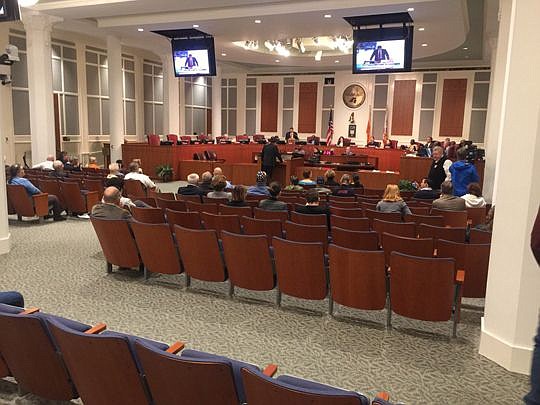
It took more than two hours Wednesday morning, but City Council wrapped up the public hearing that began Tuesday night on a proposed expansion of the city’s equal rights laws to include protection for the LGBTQ community.
The special session was made imperative at midnight Tuesday when more than 100 people who filled out speaker cards before council’s regular meeting had not been heard after more than four hours of public comments.
Under council rules, meetings must end by midnight but may be recessed and reconvened the next day.
The morning mood mirrored the evening one among speakers for and against Ordinance 2017-15, which would prohibit discrimination based upon sexual orientation and gender identity in the areas of employment, housing and public accommodations.
Enacting the bill “is the right thing to do,” said Arlington resident Laura Bennett.
She said her daughter, who is a lesbian and at college in another state, might not come home to Jacksonville after she graduates because she doesn’t feel safe without legal protection from discrimination.
“I want her to come home and feel welcome,” Bennett said.
The difference of opinion about the ordinance in the faith community also was reprised Wednesday.
The Rev. David Erickson, an Episcopal priest, spoke in support of the bill. He said the baptismal rite is based on the respect and dignity of every human being and being LGBTQ is “a blessing.”
“Passing this ordinance honors the city and it honors God,” he said.
Orange Park resident Marshall Wood has a different impression — that the protections laid out in the proposed ordinance imperil the basic beliefs of the Christian faith.
“We can’t point our finger at God and say ‘back off.’ I don’t care what the Episcopalians say,” he said.
Two speakers Wednesday said the main beneficiaries of the bill if it’s enacted could be members of the legal community.
John Beehner predicts a possible flurry of lawsuits against businesses that might run afoul of the expanded protections.
“The only winners in this law are the attorneys,” he said.
Bodie Catlin called the ordinance “a weapon of litigation for disgruntled employees who want to punish a business.”
Local artist Chip Southworth urged council to approve the legislation and commented on the possibility of a referendum on the issue, which was brought up by quite a few speakers Tuesday and Wednesday.
He said Jacksonville has a national reputation for being a “hot mess” of discrimination.
“The protections of the few are never given by the masses,” he said. “It’s unreasonable to assume a bunch of discriminatory white people are going to vote for minority rights.”
“An unaffected majority cannot protect an oppressed minority,” said Victoria Hatcher, who spoke in favor of the ordinance but against including the proposal on an election ballot.
Another speaker who referenced Jacksonville’s national reputation was radio talk show host Andy Johnson.
He said what he was hearing Wednesday reminded him of the local conversations about school desegregation in the 1950s and civil rights in the 1960s.
“This city has been an embarrassment,” Johnson said.
Speaking in favor of the status quo, Bennett Brown, who lives in Mandarin, said Jacksonville has been “blessed by God” and he doesn’t want to see the discrimination law amended.
“We don’t want to be San Francisco. We don’t want to be L.A (Los Angeles). We like who we are and we want to stay who we are,” he said.
Before the meeting adjourned, council President Lori Boyer said in addition to those who went to the podium during the hearing, 500 people who did not wish to speak had filled out cards in favor of the ordinance and 193 non-speakers filled out cards opposing the bill.
Boyer also said there will be no public comment on the ordinance Feb. 6-8 when it is reviewed by the Finance, Neighborhood, Community Investment & Services and Rules committees, upon recommendation of the committee chairs.
After more than six hours of hearing all sides of the issue “the committees have the benefit of the public comment,” she said.
Boyer encourages constituents to contact their council representative or an at-large member if they have further comments on the proposed legislation.
The city has set up a dedicated email address for the public to register their opinions: [email protected].
The full council could vote on the ordinance Feb. 14.
(904) 356-2466